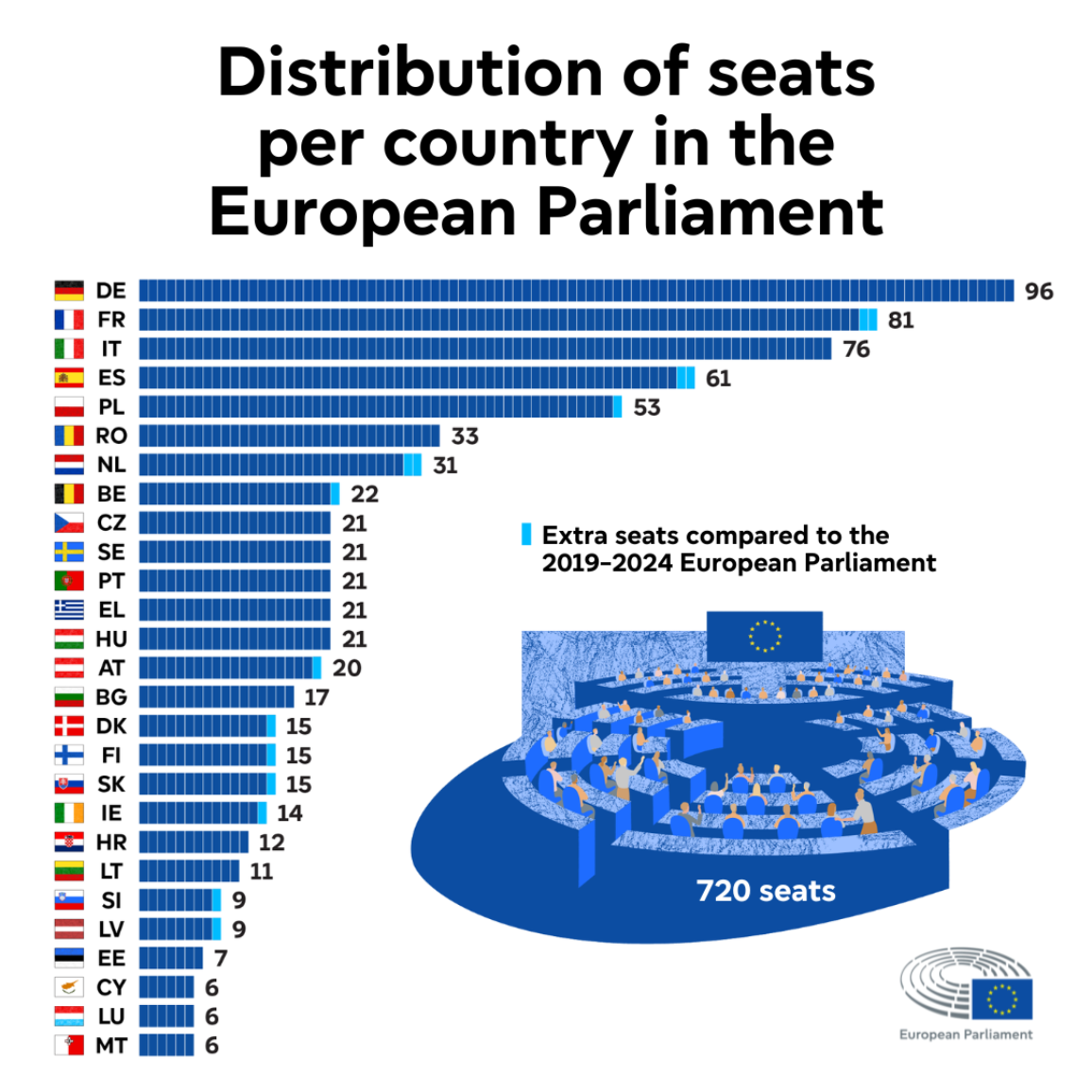
Number of seats per country in the 2024-2029 legislative term of the European Parliament.
The recent European Parliament elections unfolded with surprising stability, allowing Western elites to train their attention on the presidential campaign in the United States, with Election Day coming later this year.
With voting from June 6 to 9, the parliamentary election reached a level of scrutiny not seen since the first direct polls in 1979. This heightened interest stems from several critical factors: the burgeoning influence of the European Parliament and Commission over the past decade, the pivotal juncture of European integration against the backdrop of the Russia-Ukraine conflict, a tumultuous year in Western politics, the United Kingdom’s general election in July and the coming U.S. presidential election in November. The electoral outcomes will shape the trajectory of Western political dynamics in the years ahead.
The preceding European Parliament elections, which passed with little fanfare, were held in 2009. At that time, although the global financial crisis had erupted, its political aftershocks had yet to reverberate fully. The Lisbon Treaty, which bolstered the standing of the parliament significantly, had been inked but was yet to take effect. Subsequent votes — in 2014, 2019 and 2024 — have escalated in intensity, commanding ever-greater international attention.
These three elections mirrored a thesis-antithesis-synthesis progression. In 2014, one-fourth of the seats were seized by far-right elements, generating headlines calling the election a “political earthquake.” By 2019, the unexpected ascent of the Green Party and centrist liberals tempered the far-right surge; yet this year’s elections have witnessed a resurgence of center-right and far-right factions, relegating Greens and centrists to new roles and exacerbating the fragmentation of the EU’s political fabric while shifting the political fulcrum rightward.
Nevertheless, the transformations spurred by this election are evolutionary rather than revolutionary. Compared with its predecessors, this year’s contest was less dramatic and more incremental.
First, taking a panoramic view of the political landscape, cooperation between the three mainstay parties endures. The center-left Socialists and Democrats, the centrist Renew Europe and the center-right European People’s Party together retain 406 of 720 seats, despite a slight shrinkage in their collective sway. Although the European People’s Party (EPP) secured the most votes, it remains averse to aligning with far-right elements and met with staunch opposition from center-left and centrist factions. Further, prospects are dim for the far-right to coalesce into a cohesive third major force. Divisions persist between moderate and radical factions, with the most extreme members standing outside any formal grouping. Consequently, the political pivot point within the new European Parliament is nearer to center-right rather than spanning from center-right to far-right.
Second, personnel transitions within the new EU institutions are poised for swift resolution, ensuring a robust sense of continuity. With increased support for the EPP, the prospects for Ursula von der Leyen and Roberta Metsola’s re-election as president of the European Commission and president of the European Parliament, respectively, have heightened. Moreover, consensus prevails among member states regarding other coveted roles — president of the European Council and high representative of the Union for Foreign Affairs and Security Policy — a rare alignment compared with past terms. This unity is partly attributed to French President Emmanuel Macron’s focus on France’s early parliamentary elections and the EU’s commitment to stabilizing its political landscape ahead of the U.S. presidential election.
Third, the European Union’s policies for the coming five-year period will exhibit robust continuity. Several factors contribute to this stability: the retention of key personnel within EU institutions, including Von der Leyen’s likely re-election; member states’ resistance to a rightward shift, particularly under centrist and center-left leadership in France and Germany; and a noticeable moderation of Europe’s far-right factions. Since Brexit, no major far-right party in Europe has advocated withdrawal from the EU.
In the wake of the Russia-Ukraine conflict, even the most pro-Russian elements within far-right circles have distanced themselves from Russian President Vladimir Putin. Before the elections, Maximilian Krah, the lead candidate for Germany’s Alternative for Germany (AfD), became embroiled in a so-called spy scandal and faced criticism for insensitive remarks about Nazi history, which resulted in his disqualification. This episode underscores far-right parties’ efforts toward moderation.
Among the EU’s major policies, the “Green Deal” may be adjusted post-election, given setbacks faced by the Green Party. Public concerns over industrial competitiveness, agricultural protection and energy prices are expected to temper the pace of the EU’s environmental agenda, while its overall direction remains intact.
The most dramatic element of this year’s European Parliament elections may well be their resonance with member states. On the very night that the European elections concluded, Macron took everyone by surprise by announcing early parliamentary elections. In France’s presidential system, this move will not affect Macron’s three remaining years in office, but it will prematurely unleash the unpredictable political forces of the far-right.
In Germany, the coalition government — comprising Social Democrats, Greens and Free Democrats — suffered setbacks in the European Parliament election, casting a shadow over their ability to achieve significant progress in their final year.
Meanwhile, one of the election’s major victors, Italy’s far-right Prime Minister Giorgia Meloni, is poised to steer Italy into a more influential role in the EU’s decision-making processes.
In conclusion, this year’s European Parliament elections unfolded with relative stability, affording Western leaders the opportunity to pivot attention toward the uncertain U.S. presidential election looming later in the year and to collectively engage on broader international issues. As Western leaders attended the G7 summit in June and now prepare for the NATO summit in Washington in July, their focus has been on addressing critical global challenges with unified resolve.
